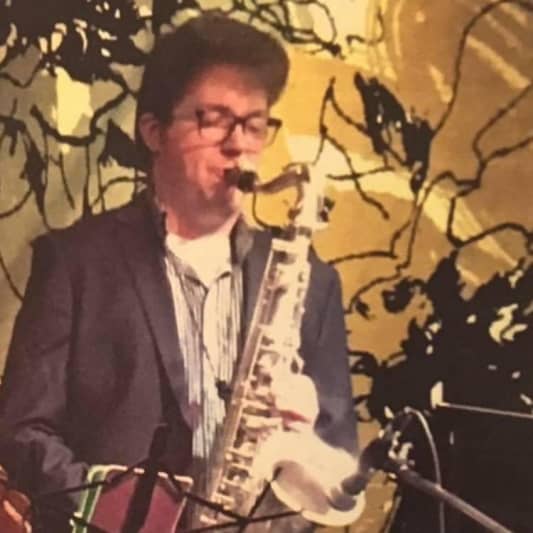
I have played, worked with and learned from some of the big names in the business such as Bob Reynolds (John Mayer), Randy Brecker (Brecker Brothers), Bob Franceschini (Mike Stern) and Bobby Shew (Horace Silver, Buddy Rich).
Studio musician located in Vancouver, British Columbia, Canada. Alto/tenor saxophone, as well as keyboards. I am well versed in Jazz, Rock, Fusion, and Funk and have the means to record at home if you desire to collaborate virtually.
Send me an email through 'Contact' button above and I'll get back to you asap.
Interview with Jamie
Q: Tell us about a project you worked on you are especially proud of and why. What was your role?
A: I just finished a two song EP called "Kinda Nuts". It features keyboardist Jonny Tobin and guitarist Nick Varelas. I'm really proud of everything on this record. The saxophone I recorded sounds professional, and the mixing and mastering (which I did myself) sounds really good. I did all the sax parts, and the production.
Q: What are you working on at the moment?
A: Right now I am working on a project to feature my own jazz fusion group "Connections Ensemble", but in a couple months I'm going to start work on my first album. No title yet, still in the writing phase, and figuring out the song list.
Q: Is there anyone on SoundBetter you know and would recommend to your clients?
A: Jonny Tobin. He is fantastic to work with. I went to jazz school with him and he one of the most in demand keyboardists and producers in Canada. He's been Grammy nominated and Juno nominated.
Q: Analog or digital and why?
A: Both. I think if you're a wind instrument player a USB mic will not get you very far. Get yourself a decent analog mic (mine is a Shure mic) and a good audio interface.
Q: What's your 'promise' to your clients?
A: Excellent quality recordings, with 100% satisfaction, no matter how long it takes.
Q: What do you like most about your job?
A: I like working with different musicians, it breathes new life into my playing and my career as an artist.
Q: What questions do customers most commonly ask you? What's your answer?
A: They will usually ask me what style of music I play, what my setup is, how long it usually takes me to get projects back to them.
Q: What questions do you ask prospective clients?
A: 1) What is your artist name? Do you have spotify? Website? 2) What style of music do you play? 3) What exactly do you need? This could range from playing background keyboard parts, to a sax solo, synth solos, to even just mixing and mastering.
Q: What advice do you have for a customer looking to hire a provider like you?
A: It doesn't hurt to reach out to anyone! I am always looking for more people to collaborate with.
Q: If you were on a desert island and could take just 5 pieces of gear, what would they be?
A: My Scarlett audio interface, my Roland RD88, my saxophone, my mic, and my laptop.
Q: What was your career path? How long have you been doing this?
A: I went to university to study jazz, and I've also studied education so I can be a teacher. I think the more things you can do in this industry the better it will be for you and the more doors it will open for your career. I have been doing this for 11 years.
Q: How would you describe your style?
A: Its definitely in the vein of jazz, but more focused on funk and fusion.
Q: Which artist would you like to work with and why?
A: Brian Culbertson is a huge inspiration for me. I think it would be a fantastic opportunity to learn from him, from recording tips, to learning more about producing, to putting together US wide tours.
Q: Can you share one music production tip?
A: Musicians, learn music production. Learn how to mix, and master your own projects. This will open way more doors for you and its an invaluable skill to learn.
Q: What type of music do you usually work on?
A: I usually work on jazz fusion and funk, but I also have an interest in instrumental hip hop.
Q: What's your strongest skill?
A: My strongest skill is my versatility. I can play almost anything in any style you desire.
Q: What do you bring to a song?
A: I bring individuality and personality to your project.
Q: What's your typical work process?
A: I will usually work on parts and record a few takes to send to you, and I can tailor them to what you want/desire, and will work with you until you are satisfied.
Q: Tell us about your studio setup.
A: Shure SM57 microphone Scarlett 2i2 Audio Interface Roland RD 88 Stage Piano Macbook with Logic Pro X
Q: What other musicians or music production professionals inspire you?
A: The ones that are specific in what they want and require from me, and are open minded and flexible regarding price,
Q: Describe the most common type of work you do for your clients.
A: Recording parts, sometimes as part of a large ensemble like a big band, but also featured artist type parts (solo feature)



